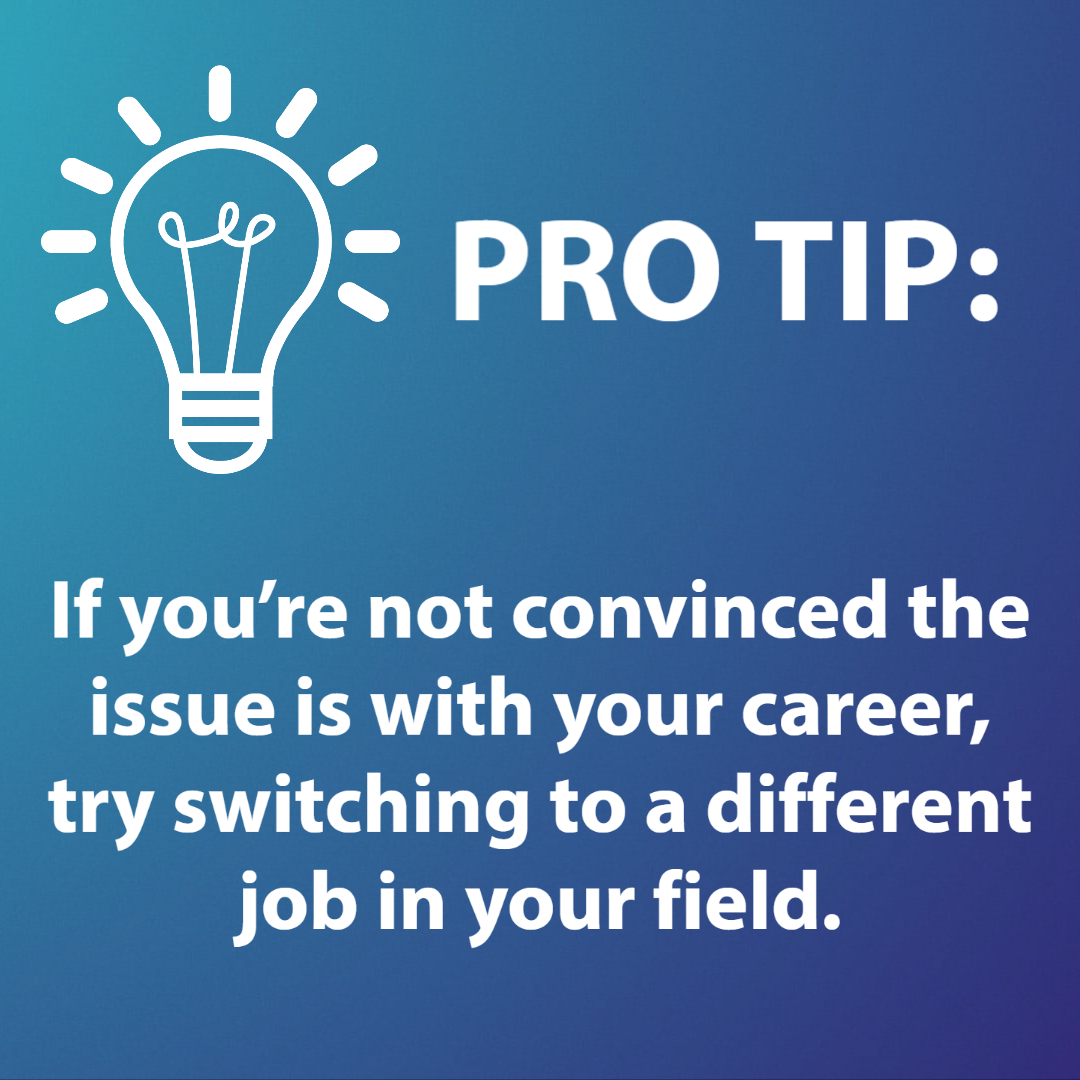I QUIT!
No matter how much you start out loving your career, odds are you will reach a point where you dream of saying those two little words.
If you’re feeling this way, you’re not alone. The average person will change careers five to seven times during their working lifetime. Because of an ever-increasing number of career choices, about 30% of people will change jobs every year. By their mid-40s, most people have already had ten different jobs!

People change careers for a variety of reasons. For some people, they change because of frustrations with the job requirements or disillusionment with the workload. Others report being unsatisfied with their job if they can’t make use of their natural abilities, and it leads them in a search for a new career path.
Individuals may also change careers because of a business closure or because they were working in a dying industry.
Any of these reasons can create a deep dissatisfaction in your life. Things can become so difficult that your personal life can begin to suffer. Your health, relationships, and more can all be disrupted as a result of your career dissatisfaction.
If you are feeling unsatisfied with your job, here are five signs that may be telling you it’s time for a career change.
5 Signs that it’s time to Change Careers
1) You’re always exhausted. If you’re always exhausted, it may be something other than a hard day at work. Chronic exhaustion is a major sign of depression, along with being listless and losing interest in your other hobbies. If you find yourself coming straight home every day after work and you can’t remember the last time you had fun with your friends or spent an evening participating in your favorite hobby, it may be time to consider a career change.
2) You no longer feel invested in your job. Did you used to love your job, but now it’s just meh? Career interest will wax and wane, but if you’ve been disinterested in your job for the past few weeks or months, then it’s definitely time to look into a new career. If you’re not convinced your problem is with your career, you can try switching jobs and staying in the same career field first.
3. You dread getting up in the morning. Do you drag your feet when it’s time to get moving for work? Are you consistently hitting the snooze button two, three, and four times even though you’ve gotten plenty of sleep? These are clear signs that something is wrong with the way you view your job. Everyone has days they don’t want to get out of bed, but when the thought of work puts a sinking feeling in your belly or makes you queasy, it’s time to move on. If you’re not convinced it’s time to quit, you can try reevaluating your schedule and habits, but if you continue dreading work, then don’t rule out the option of a new career.

4. You’re burnt out. Burnout has been an up and coming buzz word in the business world, and everyone has a different idea of what it truly means. By psychologists, burnout is classified as being in a state of emotional, mental, and physical exhaustion caused by excessive and prolonged stress. It happens when you feel overwhelmed and unable to meet your work demands. Once you get to a point of burnout, it can be hard to recover in the same setting and it can easily return. Changing careers can remedy the feelings of burnout and renew your interest in being a part of the workforce.
5. Your self-esteem is suffering. This isn’t a reason to quit all on its own, but it is a very important factor. If you’re at a point where you don’t see upwardly mobile growth or you’ve been passed up for promotions and raises, then it could be time to reevaluate your career. You should never feel stuck or easily replaceable in your current position. Instead, you should feel accepted and valued at your workplace.
Tips for Making the Switch
A career change is something that shouldn’t be taken lightly, but if you’ve made that decision, here are some tips to make your transition easier.
1. Evaluate your skills and reframe your resume. Once you have identified exactly why you would like to change jobs, it’s important to know what skills you can transfer from your current career to your next career. Even if none of your hard skills transfer from one career to the other, your soft skills and computer skills will always be beneficial in the workplace. If you’re not ready to abandon all the skills you’ve picked up at your current job, you can look for a similar career where they can still be utilized.

2. Do some research. Especially if you’ve been in the same field for a very long time, it’s important to research what you want to do instead. Your first step is to make a list of five to ten careers, circling the careers you find the most appealing or have considered before. Once you have your list together, it’s time to do some research. Take a few weeks to research what kind of education, requirements, and opportunities your new career might have. You can find this information through job listings, on websites, and by talking to people currently in the field.
3. Take note of your financial requirements. The most stressful part of transferring careers is losing financial insecurity. Before you quit your job and start the process of changing careers, you should evaluate what kind of income you require. If you’ve been in the workforce for a very long time, it may not be feasible to start off with an entry-level salary all over again. Of course, in some cases, the decrease in pay offers more benefits than consequences, such as fewer job responsibilities and shorter hours.
4. Use your connections. Don’t be afraid to use the people you know. Starting a whole new career can be very daunting when you have no relevant experience, so making use of your already established social circle can be beneficial during this career transition. While your current coworkers may not be able to help you find new career options, you can employ less obvious networks such as business conferences, online social networks, and alumni networks. These underused, smaller networks can be very helpful in this transition.
Knowing when to change careers is important for your well-being and for your future. If you’re headed towards burnout or if you’re no longer feeling fulfilled and excited about your current career, changing careers can be the key to renewing your professional happiness.
It’s easy to let inertia and financial worries stop you from making the transition from one career to another, but with a little planning and a lot of research, switching careers can be an easy and rewarding process.

Recent Comments